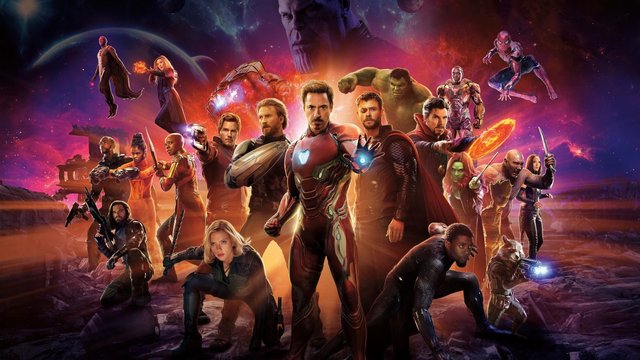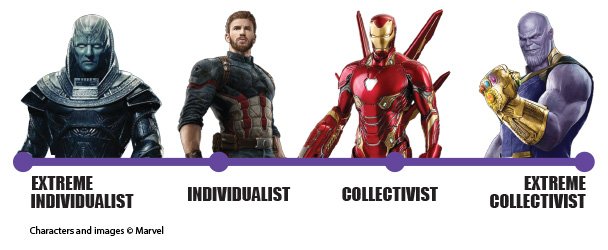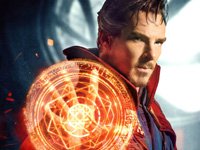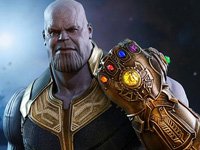Marvel Avengers Infinity War: The Theme of Sacrifice

Avengers Infinity War – The Theme of Sacrifice
by David Keener
What characteristic defines a hero versus a villain? Since everyone sees themselves as the hero of their own story, what is the difference between the two? The difference between villain and hero is the fundamental definition of altruism (sacrifice). The villain believes others should sacrifice for the “greater good.” More specifically, the villain’s belief in sacrifice lies in the mandatory sacrifice of others. Whereas the hero’s belief in sacrifice lies in the voluntary sacrifice of themselves. The villain looks externally at the world and puts the burden on others to change. The hero looks internally to determine what they can change in themselves to bring about positive change in the world around them.
It was interesting to me after watching this movie how many people said to me, "I can really relate to why Thanos did what he did." There was even a sub Reddit called "Thanos Did Nothing Wrong" This response to Thanos left me with a sinking feeling. Have our lines of morality blurred so much that we give Thanos a free pass for mass murder? Thanos doesn't enjoy killing people, he is just doing it to reduce galactic suffering right? But here's the problem with that, losing people does cause suffering. And even if he could wipe the memories of those that remained to forget those lost, he would still be abusing his power against the will of those being sacrificed.

The only part in the film that slightly blurs this definition of altruism is the sacrifice of Gamora. Thanos loses his adopted daughter, which IS a personal sacrifice. But ultimately, this is a selfish act because it is against the will of the one being sacrificed. Gamora was forced to die for a purpose she would have willingly died to stop. In this instance, Thanos only proves how dedicated he is to the sacrifice of others to achieve his goal.
On a scale from Individualist to collectivist, Captain America resides on the individualist side, Thanos is on the extreme collectivist side and Iron Man resides somewhere in the middle. This is the fundamental reason Captain America and Iron Man had conflict in Civil War. Captain America and Iron Man had conflict because of the age old debate over freedom vs safety. Steve Rogers is never willing to sacrifice freedom (individual liberty) and Iron Man is quick to sacrifice individual liberty for safety (collectivism in the form of the greater good). It wasn't until the most extreme form of collectivism showed in Thanos that they had to put their differences aside and fight him together.

The only version of an "extreme individualist" I could think of within Marvel is Apocalypse. Apocalypse believes in survival of the fittest. His version of individualism removes the non-aggression principal (NAP) from the philosophy of individualsim most follow and applies violence as a means to cull out the weak. Much like Thanos, Apocalypse believes that genocide is an answer to the problems he sees. He believes that a utopia consists of only the strongest individuals that have survived after the dust settles from his mass extinction and that compassion and empathy are a weakness that must be stomped out.
Thanos AND Apocalypse see the consequences of their actions as justified to a greater purpose even if it's at the cost of others. Murder is a means to an end for both.
Instances of SELFLESS sacrifice in the movie:
⦁ Loki.

Loki knew he would most likely die trying to stop Thanos, but he did it anyway. This was a great redemption story to the usually self-serving character.
⦁ Star Lord.

Quill was willing to sacrifice Gamora based on Gamora’s wishes and willingness to die to protect the universe. He did ruin the best plan to stop Thanos, so he loses some points for that selfish action, but overall Star Lord is much more hero than villain.
⦁ Gamora.

She was willing to die (suicide through Star Lord) in order to protect countless lives. She is a hero.
⦁ Dr. Strange.

Steven Strange was willing to die to protect the Time Stone. BUT, he was also willing to let Tony Stark and Peter Parker die if it meant protecting the stone. This technically puts him in the collectivist camp, but he knows (whether they verbalize it or not) that both would willingly die to save the lives of trillions, so we give him a pass...this time...
⦁ Vision.

He willingly sacrificed himself to destroy the Mind Stone.
⦁ Scarlet Witch

The Scarlet Witch was willing to kill her lover in order to protect countless lives. The distinction here is that Vision begged her to kill him/the Mind Stone.
⦁ Iron Man.

Although he sacrifices himself on the regular, Tony really displays his jerkiness sometimes. He tends to push others to adopt his plans quite often and his collectivist beliefs show through in other movies. Stop being such a jerk Tony, it leads to bad things cough Ultron… cough Civil War… Tony and Steven Strange have similar collectivist ideologies. When Strange says he will not hesitate in letting Tony or Peter Parker die to protect the Time Stone, Tony replies with "Nice. Good, moral compass"
⦁ Captain America.

His conversation with Vision about “not trading lives” illustrates his unwavering individualist stance. He understands that it is NOT his place to decide who should live and who should die. Captain America is all about voluntary self-sacrifice and he is never about sacrificing another, whether or not he thinks it’s for a good cause. Cap would undoubtedly WILLINGLY sacrifice himself if it meant saving another, but he would never demand that same sacrifice of another. Steve Rogers would rather lose it all than play god with people’s lives.
⦁ Black Panther.

Black Panther was willing to die in Wakanda in order to stop Proxima Midnight and Thanos' army.
Instances of SELFISH sacrifice in the movie:
⦁ Ebony Maw.

We are first introduced to Ebony Maw while he babbles about “dying for a good cause” to those being mercilessly stabbed to death on the Asguardian ship. Not only are his words delusional, but they aren’t very convincing coming from an emotionless murderer clearly only abusing his power.
⦁ Proxima Midnight.

In Wakanda she confronts Black Panther. When he says Thanos will have nothing but blood and ash in Wakanda, she responds that she has plenty of blood. She makes it clear she is willing to sacrifice every one of her soldiers to defeat her enemy. A sacrifice made FOR them to serve only her goal.
⦁ Thanos.

Thanos literally plays god with the lives of others. He has the power to do anything he wants and he wields that power as if everything he does is ultimately justified (no matter how cruel and deceptive it is). Thanos is so obsessed with destruction that he cannot even see creation as a solution to the problems he sees. The infinity gauntlet can be used for more than destruction, but he lacks the imagination to use it in any constructive way. Thanos is willing to destroy half of the lives of the universe, but this solution to his problem isn’t the only one. He could easily create more resources or at the very least use the gauntlet to make the use of resources more efficient and thus allow for the life that exists to continue without pain and suffering. By destroying life (selfish sacrifice), his attempts at reducing suffering only creates more.
Altruism (selfless sacrifice) is a good thing. It’s moral because WHEN it is voluntary. Altruism when used to subject another to your idea of mandatory sacrifice, is not moral. It’s evil because it is involuntary and demands a person to sacrifice that which they do not freely give. A hero can easily be defined by this standard. We can find the hero within by understanding the differences between these two versions of sacrifice. We can also apply this distinction to the policies and the ideas that we support. The next time we think we are doing something for a good cause, we can ask ourselves, “Is this a sacrifice I am asking of myself? Or one that I am demanding of others?”
All characters and images referenced in this article are property of Marvel Studios and 20th Century Fox.